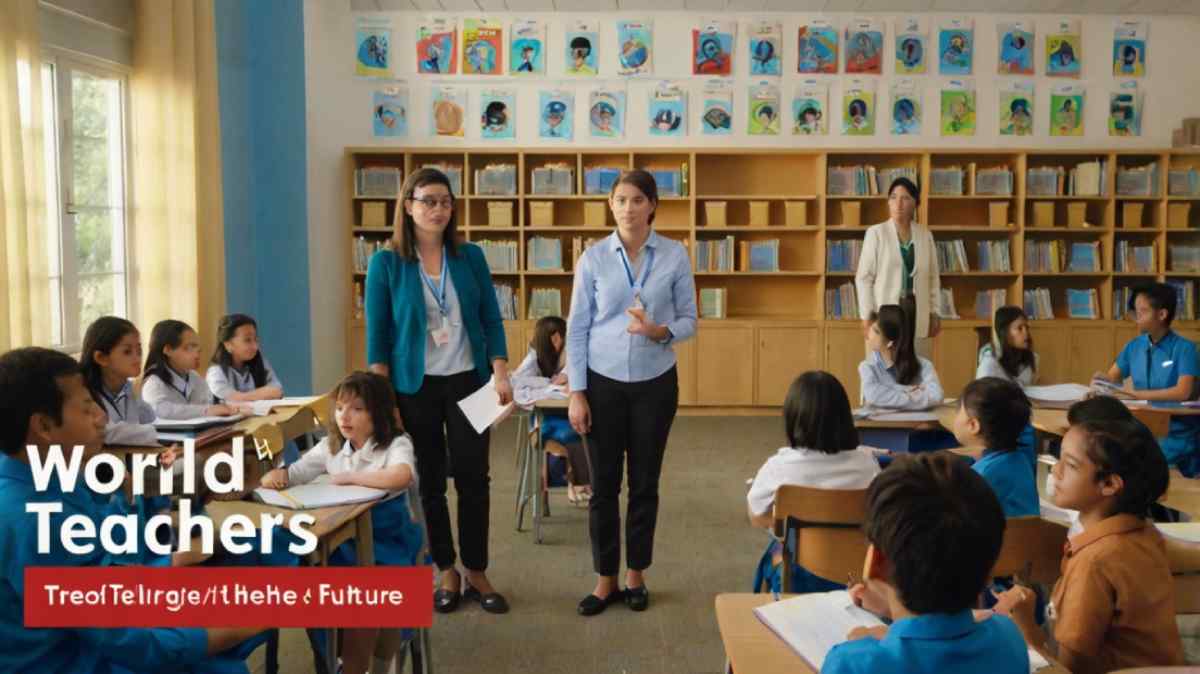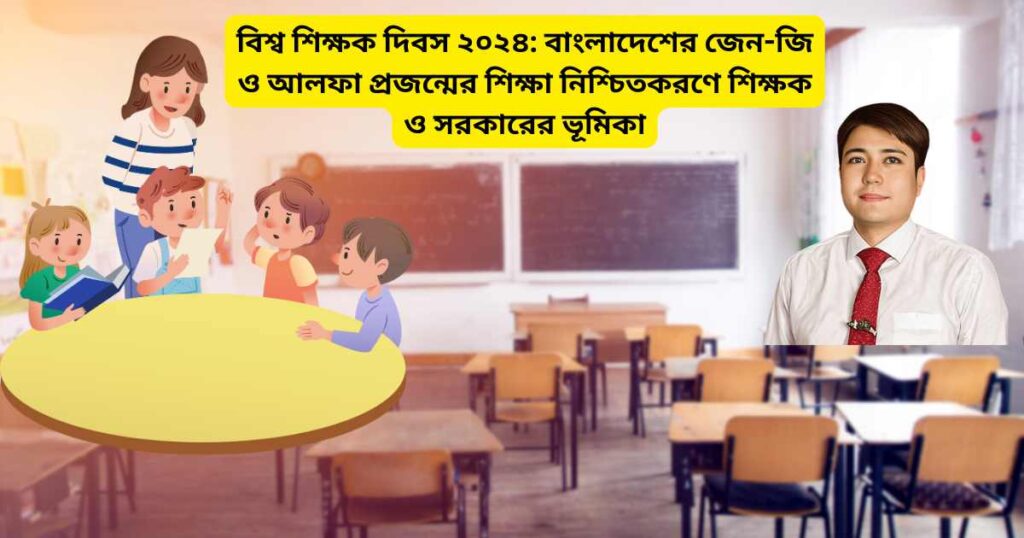World Teachers’ Day: Challenges in the Future of the Teaching Profession
Table of Contents
Toggle
World Teachers’ Day is celebrated globally on October 5 to acknowledge the significant contributions of teachers in shaping future generations. This day honors educators worldwide for their dedication, professionalism, and profound societal impact. However, reflecting on the achievements and challenges the teaching profession will face becomes crucial as we look ahead.
Technology, globalization, changing demographics, and rising expectations will all profoundly impact education systems worldwide in the ensuing decades. As the pillars of education, teachers will play a pivotal role in navigating these changes. However, they will also confront challenges requiring adaptability, continuous learning, and support from educational institutions and governments.
This article explores the teaching profession’s future challenges in various domains, such as technology integration, mental health, teacher training, globalization, changing student needs, and equity in education.
Technology Integration: A Double-Edged Sword
The Growing Role of Technology in Education
The rapid advancement of technology has already transformed education in unprecedented ways. From online learning platforms to artificial intelligence, teachers are now incorporating digital tools into their classrooms. The COVID-19 pandemic accelerated the shift toward remote learning, highlighting both the benefits and limitations of technology in education.
- Benefits of Technology:
- Accessibility: Online platforms allow students to learn from anywhere, making education more accessible to underserved communities.
- Interactive Learning: Tools like virtual reality (VR), artificial intelligence (AI), and gamification enhance engagement and improve comprehension.
- Personalization: Adaptive learning technologies tailor educational experiences to individual student needs, allowing for more customized instruction.
- Challenges for Teachers: Technical Proficiency: Many teachers, especially older educators, may struggle to keep pace with the rapidly evolving digital tools. Continuous professional development is needed to ensure they use new technologies proficiently.
- Digital Divide: Access to reliable internet and devices is still uneven across the globe. Teachers must navigate this divide, ensuring all students have equal opportunities to participate in tech-driven learning environments.
- Balancing Tech with Human Interaction: Technology enhances learning but cannot replace the emotional and social aspects of education that teachers provide. Striking a balance between screen time and human interaction will be a significant challenge.
- Future Challenges
- As technology continues to evolve, the future of education will likely see the integration of AI-driven teaching assistants, virtual classrooms, and automated grading systems. Teachers may find their roles shifting from traditional instructors to facilitators of learning, where their primary job is to guide students through personalized learning pathways designed by AI.
However, overreliance on technology poses several concerns. Automation may reduce the personal connection between teachers and students, potentially leading to disengagement. Moreover, teachers must stay ahead of technological changes, continuously updating their skills in coding, data literacy, and AI applications.
Mental Health: Teachers’ Well-Being in the Spotlight
The Mental Health Crisis in Education
Teaching has always been a demanding profession, but in recent years, the mental health of educators has gained increased attention. Teachers often work long hours, manage large class sizes, and face pressure to meet curriculum standards, all while providing emotional support to their students. The COVID-19 pandemic exacerbated these challenges, leading to widespread reports of burnout, stress, and anxiety among teachers.
- Burnout and Work-Life Balance: Many teachers report feeling overwhelmed by the demands of their job, leading to burnout. Striking a healthy work-life balance is becoming increasingly complex, especially with the added responsibility of remote teaching and constant availability via email or online platforms.
- Supporting Students’ Mental Health: Teachers are responsible for academic instruction and supporting their students’ emotional and psychological well-being. This added responsibility can be overwhelming, particularly when teachers lack adequate training in handling mental health issues.
Future Challenges
As the education system continues to evolve, teachers’ mental health will remain a critical issue. The future of education will likely involve a more significant emphasis on mental health training for teachers, ensuring they can both care for their well-being and support their students.
However, without systemic changes, such as reducing class sizes, increasing teacher pay, and providing more mental health resources, the teaching profession will continue to face high levels of stress and burnout. Addressing these issues will require a concerted effort from policymakers, educational institutions, and communities to prioritize teacher well-being.
- Teacher Training: Preparing for an Uncertain Future
The Changing Nature of Teacher Education
Teacher education has traditionally focused on classroom management, curriculum development, and subject-specific knowledge. However, as the world changes, so must how we train teachers. In the future, teachers will need a broader skill set that includes technological literacy, cultural competency, and emotional intelligence.
- Continuous Professional Development (CPD): In a rapidly changing educational landscape, teachers cannot rely solely on their initial training. Ongoing professional development will be essential to ensure they stay up-to-date with new pedagogical methods and technological advancements.
- Competency in Diverse Environments: As classrooms become more diverse, teachers will need training in inclusive education and culturally responsive teaching. Understanding the unique needs of students from different backgrounds will be crucial for fostering a supportive and equitable learning environment.
Future Challenges
One significant challenge will be ensuring that teacher training programs evolve to meet the demands of the 21st century. Traditional teacher preparation may need to be revised. Future teachers must be lifelong learners, constantly updating their knowledge and skills to adapt to new educational trends.
Additionally, global standards in teacher education may be needed. As the world becomes more interconnected, teachers may work in diverse environments where internationally recognized teaching credentials are required. Developing a global framework for teacher training will help ensure consistency and quality across different educational systems.
Globalization: Navigating a Globalized World
Education in a Globalized Society
Globalization has transformed the world into an interconnected community, and education is no exception. Students today are growing up in a world where knowledge, culture, and economies are intertwined. It has created both opportunities and challenges for teachers.
- Cultural Exchange and Diversity: Globalization has brought diverse cultures into classrooms, allowing students and teachers to benefit from a rich exchange of ideas and perspectives. Teachers must be adept at fostering an inclusive classroom environment where all students feel valued and respected.
- Global Competence: The future of education will likely emphasize global competence, where students are taught to think critically about global issues, collaborate with peers from different cultures, and develop the skills necessary to thrive in a global workforce. Teachers will need to incorporate these elements into their curricula.
Future Challenges
Teachers’ challenge in a globalized world will be preparing students for an increasingly complex and interconnected future. It will require a shift in teaching methods, emphasizing critical thinking, collaboration, and cross-cultural understanding.
Moreover, globalization may create disparities in education systems around the world. Due to limited resources, teachers in developing countries may need help to keep up with global trends. In contrast, teachers in wealthier nations may face the challenge of ensuring their students remain competitive in a worldwide market. Addressing these disparities will require international cooperation and investment in education.
Changing Student Needs: A More Personalized Approach
The Evolving Role of the Teacher
Students today are different from those of previous generations. The rise of digital technology, changes in family structures, and new social and cultural influences have shaped how students learn and interact. Teachers must now adapt to a more personalized approach to education, where the focus is on meeting the individual needs of each student.
- Diverse Learning Styles: Students learn in different ways. Some may excel in traditional classroom settings, while others benefit from hands-on, experiential learning. Teachers will need to diversify their teaching strategies to accommodate a variety of learning styles.
- Focus on Emotional Intelligence: Besides academic skills, future students will need emotional intelligence to navigate the complexities of the modern world. Teachers will play a key role in fostering emotional resilience, empathy, and self-awareness in their students.

Future Challenges
One of the significant challenges in the future will be creating personalized learning experiences for every student. As class sizes grow and resources stretch, teachers must find innovative ways to ensure each student receives the attention and support they need.
Another challenge will be preparing students for an unpredictable future. In a world where technology is constantly changing and traditional career paths are evolving, teachers must focus on developing their students’ critical thinking skills, adaptability, and lifelong learning habits.
Equity in Education: Addressing Inequality
The Ongoing Struggle for Educational Equity
Educational inequality remains a significant challenge worldwide. Despite efforts to improve access to education, disparities still exist along lines of race, gender, socioeconomic status, and geography. Teachers are often on the front lines of this battle, working in underfunded schools with limited resources.
- Access to Quality Education: In many parts of the world, quality education is still a privilege rather than a right. Teachers in low-income areas may need larger class sizes, fewer resources, and outdated materials, all of which hinder their ability to provide a high-quality education.
- Inclusive Classrooms: Teachers must be adept at creating inclusive classrooms that accommodate students from diverse backgrounds and with varying skills. It requires both specialized training and adequate support from the education system.
Future Challenges
As we look to the future, one of the biggest challenges will be ensuring that all students, regardless of their background, have access to a quality education. It will require addressing the systemic inequalities that exist in education systems around the world.
Teachers must also advocate for their students, pushing for a more equitable distribution of resources and opportunities. It will involve working within their schools and engaging with policymakers and communities to bring about broader systemic change.
Conclusion: Preparing for the Future of Teaching
The future of the teaching profession is filled with both challenges and opportunities. As society continues to evolve, so too will the role of teachers. They must be adaptable, resilient, and continuously learning to meet the demands of an ever-changing world.
However, it is essential to recognize that teachers cannot face these challenges alone. Educational institutions, governments, and communities must work together to provide the necessary resources, support, and training for teachers to thrive in their profession.
On World Teachers’ Day, we honor teachers’ dedication and hard work worldwide. As we look to the future, let us commit to supporting educators as they navigate the complex and dynamic landscape of education, ensuring that they can continue to inspire, educate, and shape the minds of future generations.



